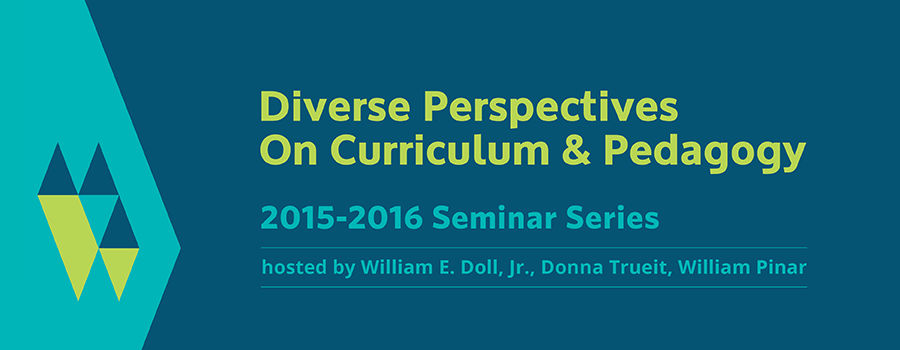Dr. Peter Grimmett| Professor and Head, Department of Curriculum and Pedagogy
May 16, 2016
View poster
Abstract
This talk builds on themes I addressed in December 2013—that, although the world is tragic, full of injustices and things that make us angry, against which we have to fight and kick back, our weapons are to be love, kindness, and beauty. I also referred to Baumann (1995) and Lingis (1994) to theorize human kinship, arguing that difference is not merely unavoidable, but good, precious, and in need of protection and cultivation. Following Lingis, I suggested that entering into conversation with another is to lay down one’s arms and one’s defenses; to throw open the gates of one’s own positions; to expose oneself to the other, the outsider; and to lay oneself open to surprises and contestation. Human kinship, I argued, comes when we eschew speaking with a representative voice, to speak out of our materiality as an earthling. This presentation picks up these themes in the exercise of academic leadership in a manner that does not exclude the stranger but speaks out of one’s “materiality as an earthling.” Hence, the title, Getting Bruised, Hurting, and Dirty. My intent is to theorize about leadership with a sense of calling toward the public good, to address the question of how academic leaders in universities can engage in the kind of action that nurtures a culture that encourages professors to be responsibly accountable and students to engage in assiduous study. My premise is that careerists rarely take the time to understand the complexities of a symbolic and cultural approach to academic leadership and my claim is that we need to select academic leaders who understand how to infuse the work of research and teaching with value, meaning, passion, and purpose.
Short Bio
Peter P. Grimmett is Professor and Head of the Department of Curriculum and Pedagogy in the Faculty of Education at the University of British Columbia (UBC). A former Associate Dean at Simon Fraser University (SFU), he also served as Director of the Institute for Studies in Teacher Education at SFU, was appointed by the BC Cabinet as the BC Deans of Education appointment to the Council of the BC College of Teachers (the professional body that governed teaching and teacher education in the province) between 2007-2010. He has recently been involved in a five-year Social Sciences and Humanities Research Council of Canada (SSHRC) -funded $2.5 million Canada-wide study of the impact of public policy decisions on conditions of teaching and learning, completed a review of teacher education program accreditation for the province of Ontario, chaired the Academy of Finland’s expert panel adjudicating the Finnish social science research grants competition, and given keynote addresses at international conferences in the USA, Norway, Sweden, Finland, Israel, Slovenia, Australia, South Korea, and South Africa.
In total, he has published 51 refereed journal articles, written 11 books and 46 chapters in books, and in May 2000, he received an honorary doctorate from the University of Tampere, Finland, in recognition of his outstanding merits as a researcher and educator in the areas of professional development and teacher education. His most recent (2012) book, Teacher certification and the Professional Status of Teaching in North America: The New Battleground for Public Education locates recent developments in teacher certification in North America within a broader, international policy context characterized as hegemonic neo-liberalism wherein economic rationalism has begun to trump professional judgment.
